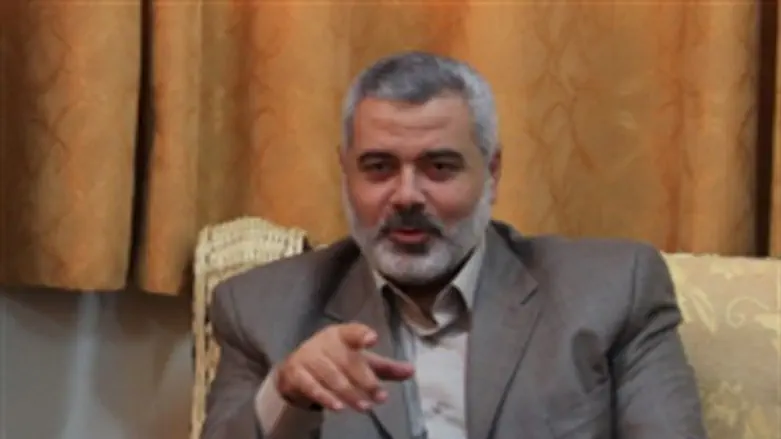
Hamas’s Prime Minister in Gaza, Ismail Haniyeh, on Sunday urged Palestinian Authority Arabs to continue what he termed the “prisoners' intifada” to support terrorist detainees in Israeli jails.
"We will fight in all arenas, take responsibility and pay the toll for the sake of their freedom," Haniyeh said at a photo exhibition in Gaza City in support of prisoners, according to a report in the Bethlehem-based Ma’an news agency.
Detainees on hunger strike are not seeking media attention but are fighting a real battle, the Hamas premier claimed, adding that solidarity activities were a duty to prisoners.
"These images tell the story of a people and a cause. They tell a story of imprisonment and a blessed march of Jihad on the land of Palestine, namely in prisons," Haniyeh added, according to Ma’an.
Palestinian Authority Arab terrorist prisoners have turned hunger striking into a pressure tactic aimed at forcing Israel to release them out of fear for their lives.
Israel has several times in the past caved to the pressure and released some hunger strikers. Currently, four terrorists are on a long-term hunger strike in hopes of bringing about their release.
The four were released in the 2011 Shalit Deal but were rearrested after violating the terms of their release.
Two of the hunger strikers are Samer Issawi and Ayman Sharawna. Issawi has been on hunger strike for 214 days and Sharawna has refused food since July, aside from a brief period in December, reported Ma’an.
Issawi was transferred to the Kaplan Medical Center last week after his condition deteriorated. His lawyer Jawad Bolous told Ma’an he was hospitalized because his pulse dropped dangerously low.
On Sunday, Issawi told Bolous that security guards and nurses were deliberately placing milk and juices near him to tempt him, and ignoring his requests to remove them, according to the report.
Issawi also said he was considering boycotting Israel's military courts after hearing that military judges had ignored all arguments posed by Sharawna's lawyers and accepted Israeli military prosecutors' allegations, according to Ma’an.
A court has handed Issawi eight months for violating his parole. However, because of a military order governing the terms of his release, Issawi's fate will only be determined by a second hearing at an Israeli military court on March 21.
That hearing could see him being sent back to jail for years.
This past week Arabs have rioted because of the death of Arafat Jaradat, a terrorist prisoner who died while in Israeli custody.
An initial autopsy confirmed that Jaradat had died of a heart attack, but did not find a cause. That autopsy also ruled out the possibility of torture.
More in-depth findings publicized Thursday confirmed that Jaradat had not been poisoned either, as the PA had claimed. The new data also reconfirmed that Jaradat had not been beaten or tortured.
However, in a report released Saturday and quoted by Ma’an, the PA prisoners ministry said Jaradat was savagely tortured by Israeli interrogators at a Shin Bet facility in Jalameh detention center.
"Then he was moved to an interrogation facility in Megiddo for further investigation because he wouldn't admit to the charges at Jalameh. Two days after he was moved, he was murdered," the report claims.
The report added, "Israeli courts and intelligence services rely on the results of investigations conducted in informer rooms without questioning and scrutinizing the interrogation methods used in these rooms."
